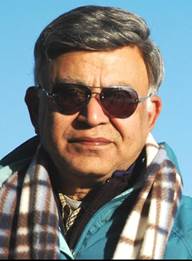By Samar Saha, Irwin, PA

I could never figure out my nephew Birendra Narayan – nicknamed Biru. When Biru was growing up in the 80’s, we all had a real concern for him in our family. He was slow in picking up everything starting from his first spoken words. His parents took him to all kinds of child specialists in Kolkata who diagnosed him as ‘learning impaired’ – a mild form of autism. The doctors and all their medicines did not help him with his mental word processing problem, or how his brain works with words and how his mind interprets phrases and clusters of words… Biru’s parents were well-to-do professionals. They were graduates from reputed universities. Initially, they tried hard to conceal Biru’s handicap. Biru’s siblings took pity with his handicap. They were normal kids. Their main aim in life was ‘intellectual pursuit’ for getting into professional schools, colleges and hopefully, to earn bundles of money. It was not that only Biru’s extended family was in this mode; the entire Indian society was, and is, in a mad dash to climb into the ‘upper class’ society.
When such madness was sweeping over the entire country, Biru’s parents were puzzled on how to raise him. How to rear an autistic child in India? After much deliberation, they decided to put him through an unconventional schooling, meant for autistic children. Their record was not stellar, but the school did focus on children’s confidence building as a part of their education. Obviously, Biru was lacking in that department. Slowly gaining this self-confidence began to change Biru, despite his handicap. Family members began noticing this change. Steadily he completed his high school courses — not in flying colors, but with so-so grades.
Biru tried sports, music, and painting, in that order, but eventually settled on business. He turned out to be a good entrepreneur when he opened his own travel agency. His parents only knew that he worked as an employee in a travel agency. Soon he expanded his business and became a tour operator without his family knowing about it. That part of the business shot up like a rocket as the Indian middle-class income took off in the new millennium. They all now had extra money and disposable time to spend on vacations. That Biru was in this transition was Providence’s gift to him. In organizing tours for his affluent clients, Biru became so busy that he could hardly take any time off for himself even after hiring more associates. Others around him might have considered him a ‘retard’ at one point, but now, everyone saw his capability as he bloomed as an entrepreneur. For the past ten years he has been doing a prosperous business. He turned out to be a street-smart instead of a book-smart person.
So, what makes a person successful in life? More importantly, and more fundamentally, what is “successâ€? Is it fulfilling the expectation of your family? or society? or yourself at a given point in life? The term ‘successful’ is relative and so fleeting. Your own approach may be unorthodox. Your desire may be trailblazing but ‘risky,’ whereas your parental expectation could be time-tested and therefore considered ‘safe.’
We all live in this world as social beings, trying to make a living helping each other in some context. A balanced person has both inner and outer goals and yearnings as well.
A ‘balanced’ person has a strong emotional core to survive an adversity or a tragedy and make something of oneself in life. Then there are other types. These are “gifted†and “successful†individuals, seen in the context of their place and time. Often, many are self-absorbed and self-centered and suffer from alienation, loneliness, and apathy towards others. Yes, these individuals can be persons of considerable repute, wealth and power. As it happens, you can be one or the other — but cannot be both. We were all humbled when Biru showed us this truth by his own example.  ♠
